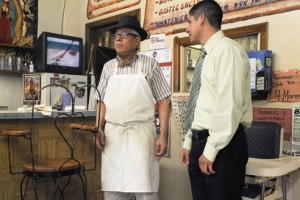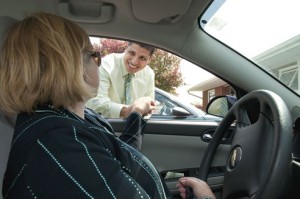 Our 2010 Annual Report, “A Day in the Life of an Academic Geriatric Nurse,” includes photographic profiles of 18 nurses who have received BAGNC awards or who play key roles in the program. Today we feature Jimmy Reyes, DNP, MSN, RN, who received a 2008-2010 BAGNC predoctoral scholarship award to study diabetes self-management in Latino older adults.
Our 2010 Annual Report, “A Day in the Life of an Academic Geriatric Nurse,” includes photographic profiles of 18 nurses who have received BAGNC awards or who play key roles in the program. Today we feature Jimmy Reyes, DNP, MSN, RN, who received a 2008-2010 BAGNC predoctoral scholarship award to study diabetes self-management in Latino older adults.
JAHF: Your research is focused on the health care needs of underserved populations, specifically Latino older adults living in rural communities. How did you get started with this?

Jimmy: I'm an adult/geriatric nurse practitioner and I've been working with the Latino community for many years. For example, I organized and managed a clinic for migrant workers. There are not many health care providers who see these patients. One nonprofit group in Des Moines, Proteus, provides some infrastructure and mobile clinics, but continuation of care is a big issue and many migrant workers fall through the cracks. I'm specifically focused on trying to improve diabetes care among this population who come seasonally. It's very challenging because once they leave here to go home or to another place where they do migrant work, it's difficult for them to continue to buy medications and monitor blood sugar levels. At the clinic, we're trying to alleviate some of the barriers to obtaining health care, especially as it relates to diabetes, which is associated with other health problems such as obesity and cardiovascular disease. Mortality and morbidity rates are higher for Latinos with diabetes than other groups.
JAHF: You are dedicated to a community-based participatory approach to your research. Can you tell us how you incorporate that into your work?
Jimmy: In the past three years I have worked with the Institute for Clinical and Translational Science and my advisor Toni Tripp-Reimer, PhD, RN. We are using a community-based participatory approach where we partnered with four federally funded community health centers that are part of the Iowa Primary Care Association. Each center is 51 percent governed by members of the community. Through conversations with administrative staff, providers, nurses, and community members, diabetes care was identified as an area that needs to be improved. This goes along with my interest in diabetes self-management and connecting patients to diabetes care resources. We conducted several surveys to understand gaps in service. Then we chose patients from among those surveyed to participate in focus groups. Two of the focus groups were conducted in Spanish. We found that patients with uncontrolled diabetes need a lot more support. They have more stressors, barriers, and burdens. We also found that many of them have difficulty with problem-solving, especially older adults. This may be due to language barriers or family obligations. Many of them tend to take care of others first, especially family members.
Using this information as a framework for family-centered care, we are piloting a project with Iowa State University that is based on a nutritional diabetes evidence-based program called "Dining with Diabetes." We're translating it into Spanish and making sure that it is culturally sensitive, relevant, and appropriate.
Another program that we're piloting is called the Pro-Active Care Project, which has a diabetes component. One part of this is an Internet portal to help patients access diabetes information. They can go online to interact with providers, check laboratory values, and request medications. One of our partners for that project is the Iowans for Social and Economic Development. They offer free computer classes and assistance using the Web site. This project also involves a care manager and a health card that allows participants to obtain free medications.
With these projects we want to see if it's feasible to partner with community members, get their input, evaluate and analyze the data, feed that data back to the governing board, which is composed of community members, and make sure that we are engaging everyone in all aspects of this approach.
JAHF: You are obviously dedicated and passionate about your work. What inspired you to pursue a career in geriatric nursing?

Jimmy: My grandmother, who was a nurse in Chile. I lived with her when I was a child. She would tell me stories about being a community health nurse. I was very interested in what she was doing and I felt my calling. I wanted to help others who did not have resources, especially older adults. When I came the United States that inspiration came with me. I went to the University of Iowa because they have a very strong geriatric program. I've met great professors, like Lisa Skemp, PhD, and Dr. Tripp-Reimer, who have involved me in their research. The financial support and networking opportunities of the BAGNC program have also been extremely valuable. Every time I went to the BAGNC Leadership Conference it empowered me to continue to pursue my passion of working with older adults.
This is the fourth in a series of blogs celebrating the release of our 2010 Annual Report, “A Day in the Life of an Academic Geriatric Nurse.” Links to the series are below:
